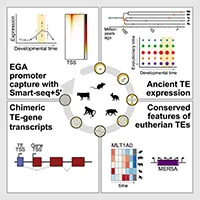
Revolutionary Discovery: Ancient Viral DNA Plays a Vital Role in Early Embryo Development!
2025-01-23
Author: Li
Introduction
In a groundbreaking study led by researchers from Helmholtz Munich and Ludwig-Maximilians-Universität (LMU), a team has unveiled an astonishing role for ancient viral DNA, previously deemed as mere remnants or 'genomic fossils.' This new research reveals that these long-forgotten genetic sequences are instrumental in the early stages of embryo development.
Key Findings
Utilizing a meticulous single-embryo atlas and conducting comparisons across multiple mammalian species, including mice, cows, pigs, rabbits, and rhesus macaques, the researchers made an extraordinary finding: transposable elements, or jumping genes, spring back to life shortly after fertilization. This reactivation may significantly impact how cells begin to specialize and ultimately form distinct tissue types in developing embryos.
The study found that even viral elements thought to be 'extinct' are reactivated during early development, with each species exhibiting unique variants. Dr. Marlies Oomen, a co-first author of the study, stated in Science Daily, 'This approach offers a novel way to influence cell fate, such as directing stem cell differentiation, which typically requires the simultaneous manipulation of hundreds of genes.' This places a spotlight on the critical need to explore regulatory mechanisms governing these ancient transposable elements.
Implications for Research
Previous research mainly concentrated on mouse or human models, leaving vast gaps in understanding the universal functions of these viral remnants in mammals. By compiling an extensive dataset of transposable elements across a diverse array of species, the researchers aim to provide a crucial resource for developmental and reproductive biologists. The implications of these findings could be game-changing—from enhancing fertility treatments to advancing regenerative medicine by harnessing the extraordinary cellular plasticity present in early-stage embryos.
Expert Insights
Prof. Maria-Elena Torres-Padilla, who led the study, remarked, 'Our research uncovered that transposable element activation is a distinctive feature of early embryos in several mammalian species. This finding is significant because these early-stage cells can differentiate into all body cell types. By deciphering how these cells regulate ancient viral elements, we gain critical insights into cellular plasticity.' She emphasized that this study paves the way for future exploration into specific regulatory elements, holding widespread potential for health, disease treatment, and the manipulation of cellular processes.
Future Prospects
Looking to the future, the ability to selectively manipulate these understudied DNA segments could revolutionize gene editing and cell therapy, enabling scientists to target whole groups of genes simultaneously. This remarkable discovery may transform the landscapes of tissue engineering and personalized medicine, leading to tailored treatments that could battle diseases more effectively than ever before.
Conclusion
The excitement around this transformative research is palpable, as scientists and medical professionals alike anticipate the potential these findings have to reshape our understanding of life itself. A new era in genetic research is upon us—will this breakthrough redefine the possibilities of human development and regeneration?


 Brasil (PT)
Brasil (PT)
 Canada (EN)
Canada (EN)
 Chile (ES)
Chile (ES)
 Česko (CS)
Česko (CS)
 대한민국 (KO)
대한민국 (KO)
 España (ES)
España (ES)
 France (FR)
France (FR)
 Hong Kong (EN)
Hong Kong (EN)
 Italia (IT)
Italia (IT)
 日本 (JA)
日本 (JA)
 Magyarország (HU)
Magyarország (HU)
 Norge (NO)
Norge (NO)
 Polska (PL)
Polska (PL)
 Schweiz (DE)
Schweiz (DE)
 Singapore (EN)
Singapore (EN)
 Sverige (SV)
Sverige (SV)
 Suomi (FI)
Suomi (FI)
 Türkiye (TR)
Türkiye (TR)
 الإمارات العربية المتحدة (AR)
الإمارات العربية المتحدة (AR)